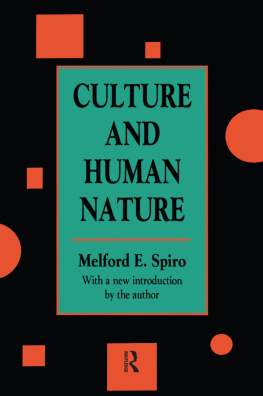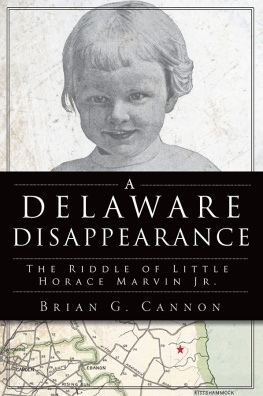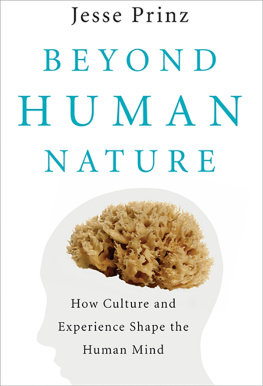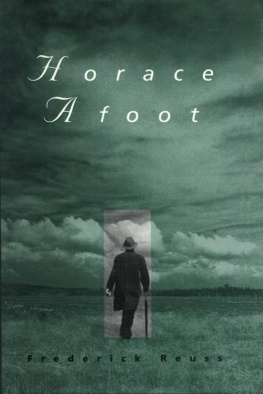Originally published in 1987 by the University of Chicago Press.
Published 1994 by Transaction Publishers
Published 2019 by Routledge
2 Park Square, Milton Park, Abingdon, Oxon OX14 4RN
52 Vanderbilt Avenue, New York, NY 10017
Routledge is an imprint of the Taylor & Francis Group, an informa business
New material this edition 1994 Taylor & Francis
All rights reserved. No part of this book may be reprinted or reproduced or utilised in any form or by any electronic, mechanical, or other means, now known or hereafter invented, including photocopying and recording, or in any information storage or retrieval system, without permission in writing from the publishers.
Notice:
Product or corporate names may be trademarks or registered trademarks, and are used only for identification and explanation without intent to infringe.
Library of Congress Catalog Number: 93-30304
Library of Congress Cataloging-in-Publication Data
Spiro, Melford E.
Culture and human nature / Melford Spiro ; edited by Benjamin Kilborne
and L. L. Langness.
p. cm.
Originally published: Chicago : University of Chicago Press, 1987.
With new introd.
Includes bibliographical references and index.
ISBN 1-56000-702-8
1. Culture. 2. AnthropologyPhilosophy. 3. Ethnopsychology.
I. Kilborne, Benjamin. II. Langness, L. L. (Lewis L.), 1929- III. Title.
GN357.S68 1994
306dc20
93-30304
CIP
ISBN 13: 978-1-56000-702-9 (pbk)
ISBN 13: 978-1-138-52182-7 (hbk)
T HE ARTICLES collected in this volume, first brought together and re-published in 1987 by Benjamin Kilborne and L.L. Langness, explore some of the relationships that, in my view, obtain among culture, society, and the human mind. Within this framework this collection addresses a range of theoretical issues including the limitations of cultural determinism and cultural relativism, the problem of explanation in the social sciences, and the importance of a comparative approach for the study of social and cultural systems.
One of the critical emphases of this collection is the importance not only of cultural variables, but also of psychological and social variables, for the understanding of human behavior and human belief systems. Seeing as most of the articles are based on research conducted in the Micronesian atoll of Ifaluk, an Israeli kibbutz, and a village in Upper Burma, they hardly minimize the importance of culture for such understanding. Nevertheless they argue that social actors possess motivational dispositions and cognitive orientationsboth parochial and universal, and both conscious and unconsciousthat, while derived in part from their cultural heritage, are also derived from their social experience (most especially early experience in the family), as well as from the evolutionary status of our species.
Spanning the years between 1961 and 1984, some of the views expressed in these articles have undergone change, not only in the period subsequent to that time interval, but also within it. Moreover, even when they have not changed, in retrospect I wish that these views had been expressed with greater clarity and felicity. Nevertheless, except for typographical errors, I have decided (as did Kilborne and Langness) to republish these articles in their original form.
An implicit theme running throughout this collection is that contemporary anthropological orthodoxy has replaced an older biological and psychological reductionism with its own cultural reductionism. That is, in the case of many contemporary anthropologists, their interpretations and theories of human behavior, belief systems, emotions, and motivation rest on a wholesale form of cultural determinism and a radical type of cultural relativism which leaves little (if any) theoretical space for the concept of a common human nature. Drawing, however, on my own research in Ifaluk, Israel, and Burma, as well as on published reports on other societies, the following articles argue that despite the wide diversity in human cultural systems, important panhuman characteristics nevertheless are to be found, for example, in sex-role differentiation, aggression, world view, and the Oedipus complex, among others.
Although my reasons for rejecting wholesale cultural determinism and radical cultural relativism are suggested in various of the following chapters, and explicated in detail elsewhere (Spiro 1992: ), nevertheless because of the ambiguities surrounding culture, cultural determinism, and cultural relativism, not to mention human nature, in order to preclude misunderstanding it is perhaps useful to indicate at the outset how I am using these terms here. Let us begin with culture.
Although for the past quarter century most anthropologists have tended to view culture as a symbolic or ideational systemsome focusing on the symbols, some on their meaningsnevertheless they have not consistently employed the term culture to designate either the one or the other. Rather, they also employ that term, just as it had formerly been employed, to designate two other things, as well: (a) a social group (one of the critical characteristics of Ifaluk culture is the virtual absence of interpersonal aggression) and (b) the totality of a groups customs, beliefs, artifacts, and technology (Ifaluk culture is characterized by matrilineal descent, hereditary chieftanship, a belief in ghosts, horticulture, outrigger canoes, etc.).
Since such inconsistency in the use of a single term is not only confusing, but also (as we shall see below) theoretically misleading, in this volume culture designates an ideational system exclusively, that is, a system of ideas, values, and norms. More specifically, it designates the subset of ideas, values, and norms that (a) are encoded in public symbols and other public signs, (b) are acquired by cultural novices in virtue of their social transmission, and hence (c) are in varying degrees socially shared. In short, culture, as that term is used here, designates traditional ideas, values, and norms. Correspondingly, a culture designates the traditional ideas, values, and norms that are found in some particular social group, and consequently constitute the cultural heritage of that group.
Often these elements of their cultural heritage are transmitted to cultural novices intentionally, and by means of verbal instruction, in which case they are conveyed in the form of propositions, descriptive (the Buddha discovered the Noble Eightfold Path), prescriptive (it is wrong to steal), and directive (a successful rice crop requires that the paddy fields be irrigated). Often, however, traditional values, ideas, and norms are acquired by the novices indirectly, as a consequence of their observation of, and participation in, social relations, religious rituals, and the like. Although in the latter case these cultural elements are not acquired in the form of propositions, still that is the form, or so I would claim, in which the novices typically represent them in their minds.
In either event, from the perspective of cultural novices the ideas, values, and norms that comprise their cultural heritage are wholly outside them. That is, they are located in public symbols and other public signs that represent them, in the behavior of social actors that express them, and in the minds of cultural initiates that hold them. As a consequence, however, of their enculturation, the erstwhile novices themselves come to represent these cultural elements in symbols and other signs (both public and private), and to express them in their own behavior, because now these elements are also located in










